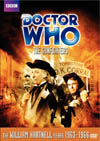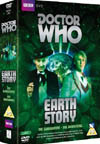DVD Extras include:
The "Doc" is in.This story's saving grace "Ace in the Hole" is William Hartnell, who for once is on hand for all the episodes, and puts in an incredibly good showing, as the Doctor has many excellent scenes to get thoroughly involved in. No matter how far off-track the rest of the story's elements wander, I just absolutely love his character and his performance in this one.As is common in any good historical story, mistaken identity gets the time travellers involved in events. In this story, the Doctor's tooth has broken down instead of the TARDIS, for once, leading him to get taken for dentist Doc Holliday in a predictable yet amusing way. Of particular note is his first scene in the saloon, which is quite enjoyable in allowing him to expertly bluff his way into getting the upper hand. The jokes surrounding his introduction as Doctor Caligari (referring to a film about a crazy professor who kept a Frankenstein-like sleep-walking zombie in a TARDIS-like box between side-show performances) are hilarious IF you know the references. In later stories when the Doctor no longer disappears for episodes at a time, one of my areas for criticism will be the seemingly mandatory episode in which he is confined to a cell throughout. This almost happens here in the second episode, but it is particularly well done in "The Gunfighters" as it becomes quite clear in several enjoyable scenes that this is exactly where the Doctor wants to be for the time being. His seemingly casual perusal of Johnny Ringo's "wanted" photo at this time is also crucial to the unfolding of the plot. And the final episode has the Doctor taking heroic action, through negotiation instead of violence, as he sets out to rescue Steven and Kate, and possibly avert the ensuing bloodshed as well, all as the official deputy Sheriff of Tombstone, Arizona. Any prosecuting Time Lords in the audience should take note - he did not meddle! His assistance was "most specifically requested, and not just by anyone, but by the man in whom authority was vested!" The Doctor's character shines brightly in this story, making well known his dislikes for guns, violence, and alcohol, and showcasing his interest in seeing justice upheld. This starts to sound like "The Gunfighters" was a great story, and perhaps it could have been if these elements had been emphasized. However, the Doctor's final heroic scene is left hanging, and ultimately unresolved at all, as the lamest version of OK Corral action in cinema upstages this, and we cut back never knowing what became of Pa Clanton at the conclusion of his confrontation with the Doctor, or how exactly Steven's rescue was accomplished. The focus was definitely not on the story's true strengths. As acting goes, we get about as good as anything from any of Richard Martin's Doctor Who stories, but when it comes to camera angles and shooting television, Rex Tucker is miles ahead, (apart from the shootout at the very end which is totally lame). Shots are well composed, and actors and cameras find their spots on time and coordinate well. Sets and costumes are also well done - and the Western setting is well realized in the limits of the studios, with even a few live horses brought in to good effect. The TARDIS does not make a spectacular entrance, materializing off screen. Many season two and early season three stories have kept us satisfied with a good effect, so perhaps it is excusable, but a few too many season three stories are doing the TARDIS on the cheap, particularly here in "the dregs".
The Ballad of the Last Chance RatingsMy biggest complaint has got to be the lyrical Ballad music, which I believe to be the single largest factor leading to this story's bad reputation. It kind of cements into place the off-colour tone of the acting and creates all kinds of timing problems for the drama that diffuse tension in scene after scene, including cliffhangers. Lynda Baron does manage to sing it all well enough, but she will do better in the much more relevant role of Captain Wrack in the early 80's story "Enlightenment" (story no. 128). Unlike the acting, the Ballad simply gets more nauseating and nerve-"Wrack"-ing with repeat viewing of this story.First of all, "The Gunfighters" is a cinematic telling of the OK Corral tale. Now the incidental music, consisting of endless sung ballads with piano accompaniment, MIGHT very well pass as something you might actually hear if you went to the Wild West, and it's possible that news and stories might be commented on and passed on through the lyrics. So a certain sample of it in the program MIGHT be a nice touch, and MIGHT work well as something played in the bars and saloons - like part of the scenery. Apparently, this was more or less what writer Donald Cotton had in mind. But to have it dubbed over the whole story as background incidentals, with the partly obnoxious lyrics trying to be part of the main story-telling, was a mistake. Don't sing the story, just video-tape it! It's a TV episode, not a Broadway musical, or ballad soapbox! And what was the thinking behind expanding the lyrics and the music's role? Perhaps Rex Tucker had done too much children's television, perhaps it had nurtured an instinct in him to be patronizing, and on some level perhaps he was just looking for an excuse to use his daughter's singing voice, which couldn't handle the Ballad's style anyway and had to be replaced by Baron. Incidental music should be used for setting the mood. This music is virtually the same every time it is played, so you end up with one mood trying to cover all bases, and it doesn't work, especially as a gay mood is not appropriate when men are being shot and killed all over the place. It becomes especially nauseating when it is sung over two identical zoom-outs over Charlie's body in the bar, or when the lyrics patronize the foolhardiness of anyone who opposes the Earps enforcement of the law, especially as the Earps went way outside the law on this particular escapade. Historical accuracy is a moot point here, as the lyrics don't even stay true to the events in the script at hand. Holiday and the Earps quite rightly have nothing to do with the law in this version of the shootout; the Doctor's your only actively involved lawman at this point! The lyrics would have us believe that the shootout is the most exciting story we'll ever hear of. There's a much more interesting one going on between the Doctor and Pa Clanton as this is being sung, which isn't getting its due attention! Worse yet is director Rex Tucker's three time refusal to remove the Ballad at this particular point, much to script editor Gerry Davis's and producer Innes Lloyd's disappointment. Tucker should take due credit for building the drama quite nicely all through episode four, yet he threatens to remove his name from the credits if forced to take out the Ballad, which, along with the cheesy shots of dying Clantons, has ruined the entire mood of the piece. Tucker may be experienced enough to know what to do with a camera, but he had yet a lot to learn about good cinematic and dramatic taste. "The Gunfighters" concludes with an in-TARDIS scene as a teaser for the next story, which was all a bit too short for my tastes! Indeed, in syndication, the actual cliffhanger (showing the face of the savage) is chopped out. A similar butchery happened to the lead in to "The Celestial Toymaker" (story no. 24) at the end of "The Ark" (story no. 23) for much the same reason. It's a great pity that this was being done, as so many early Doctor Who episodes are missing; must they also chop-up the ones that we have left? Or at least why not be more tasteful in the editing, and cut out the Ballads instead?!
At any rate, our endurance of "the dregs" of season three is now finally over, and high quality returns to the stories of Doctor Who.....
International Titles:Deutsch: (Die Revolverhelden)Magyar: "A puskások"
This story is available on DVD and VHS video:
Comments on this article are welcome. You may contact the author from this page:
|








